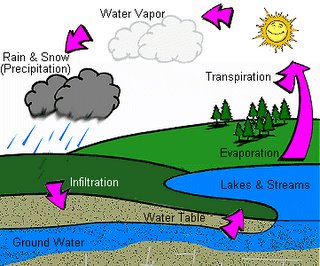What are clouds and how are they formed?
 We have all looked up to the sky and most times seen this white puffy cloud speeding or moving slowly over the sky which varies in shape and size from time
We have all looked up to the sky and most times seen this white puffy cloud speeding or moving slowly over the sky which varies in shape and size from time to time. Sometimes clouds seem to cover the most of the sky, at other times it may scattered all over the sky, other times you may just see a single cloud moving over the vast blue sky and sometime
to time. Sometimes clouds seem to cover the most of the sky, at other times it may scattered all over the sky, other times you may just see a single cloud moving over the vast blue sky and sometime s they are no where to be found in the sky - leaving the blue sky spotless. Clouds can tell us to some extent how a day is going to turn out. Some of us even look to the clouds to
s they are no where to be found in the sky - leaving the blue sky spotless. Clouds can tell us to some extent how a day is going to turn out. Some of us even look to the clouds to see if their are any clues on any weather condition that may cause rainfall or a storm. So, we have all seen a cloud and can even describe its'appearance but have you ever wondered what clouds are and how they are formed? Well, if you are in search for an answer then this weeks' article will therefore answer this question. Ponder or wonder no more! In some future article we will look on the different types of cloud , the naming of clouds and there classification.
see if their are any clues on any weather condition that may cause rainfall or a storm. So, we have all seen a cloud and can even describe its'appearance but have you ever wondered what clouds are and how they are formed? Well, if you are in search for an answer then this weeks' article will therefore answer this question. Ponder or wonder no more! In some future article we will look on the different types of cloud , the naming of clouds and there classification.
What are clouds? A cloud is a visible accumulation of very tiny water droplets or solid ice crystals that float in the air (troposphere). Clouds are usually white in appearance due to the fact that it reflects (scatter) all the visible wavelengths of light from the sun. However, clouds can also appear dark in appearance
A cloud is a visible accumulation of very tiny water droplets or solid ice crystals that float in the air (troposphere). Clouds are usually white in appearance due to the fact that it reflects (scatter) all the visible wavelengths of light from the sun. However, clouds can also appear dark in appearance taking on the color grey or black. This will depend on the amount of sunlight passing through it, in relation to the thickness of the cloud. clouds are always in motion and changing shape which is caused by the wind and warmer air (dryer air) as water is lost to the surrounding air.
taking on the color grey or black. This will depend on the amount of sunlight passing through it, in relation to the thickness of the cloud. clouds are always in motion and changing shape which is caused by the wind and warmer air (dryer air) as water is lost to the surrounding air.
How are clouds formed
Water can be found in three forms or in the three States of Matter: solid (ice), liquid (water) and gas ( water vapor). When the Sun shines on the Earth the light energy (solar heat) from the Sun causes the temperature in the atmosphere, as well as on the surface of the earth to rise, causing water from plants (transpiration) and from the surface of earth such as the soil, ponds, lakes, and sea to rise (evaporation) into the sky as an invisible water vapor. As air rises (by convection) it expands and the water vapor moves upward in the atmosphere while the temperature and the pressure of the air (atmospheric pressure) decreases. When this happens, the air gets colder to the point where it cannot hold as much water vapor (saturation point) as it would in warmer air. This will result in some of the excess water vapor to condense and form water droplets or ice, while some will form on microscopic (tiny) particles of dust, smoke or salt that are floating in the air, thus forming a tiny water droplet or ice crystals around each particle. When billions of these tiny and light water droplets or ice crystals accumulate they become visible clouds that move easily in the winds. Cloud forming ice particles will depend on the temperature and the height at which the clouds are formed.
Precipitation (e.g. rain and snow)
When water droplets that make up clouds join to form bigger drops,they then become too heavy to float in the air and they then fall from the sky as either rain or snow. The water will then end up again in lakes, river, sea, the earth and by plants where the process repeats it self all over again. This plays a major role in the water cycle.
Related article:
Why is the sky blue


 R. Edmondson
United States
R. Edmondson
United States












































6 Comments:
That's very informative. Thanks. Happy New Yr : )
Nice update!
Thanks for the lesson!
Peace:
Thank you very much and same to you :) Glad to have you back and to know that you are okay :)
Crazy like a fox:
You are more than welcome, you have a great blog:) keep it up! I would be more than happy to have your son as a regular reader here.
Apart from being a family friendly site, the purpose and aim of my blog is to impart quality content in all subject areas that is both informative and interesting to reach a wide cross section of readers. This is provided in an easy and understandable manner in spite of ones background knowledge.
Thanks for the comment.
Furkid:
You are welcome and thanks :)
Puremood:
That’s great. Now, if you not only remember it but know it also then, this will be a revision lesson for you LOL.
Thanks for stopping by.
Later.
Did you know? Meghalaya, a state in India is known as "The Abode of Clouds".
Noiz:
I didn't know that. Thanks for the info. and for stopping by :)
Professional custom paper writing services work in sooth hard to help you with short and long texts, elementary and complicated written assignments, essays, course works, term papers, etc.
Post a Comment
<< Home